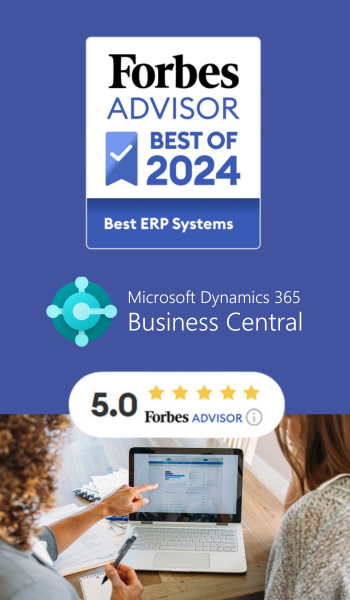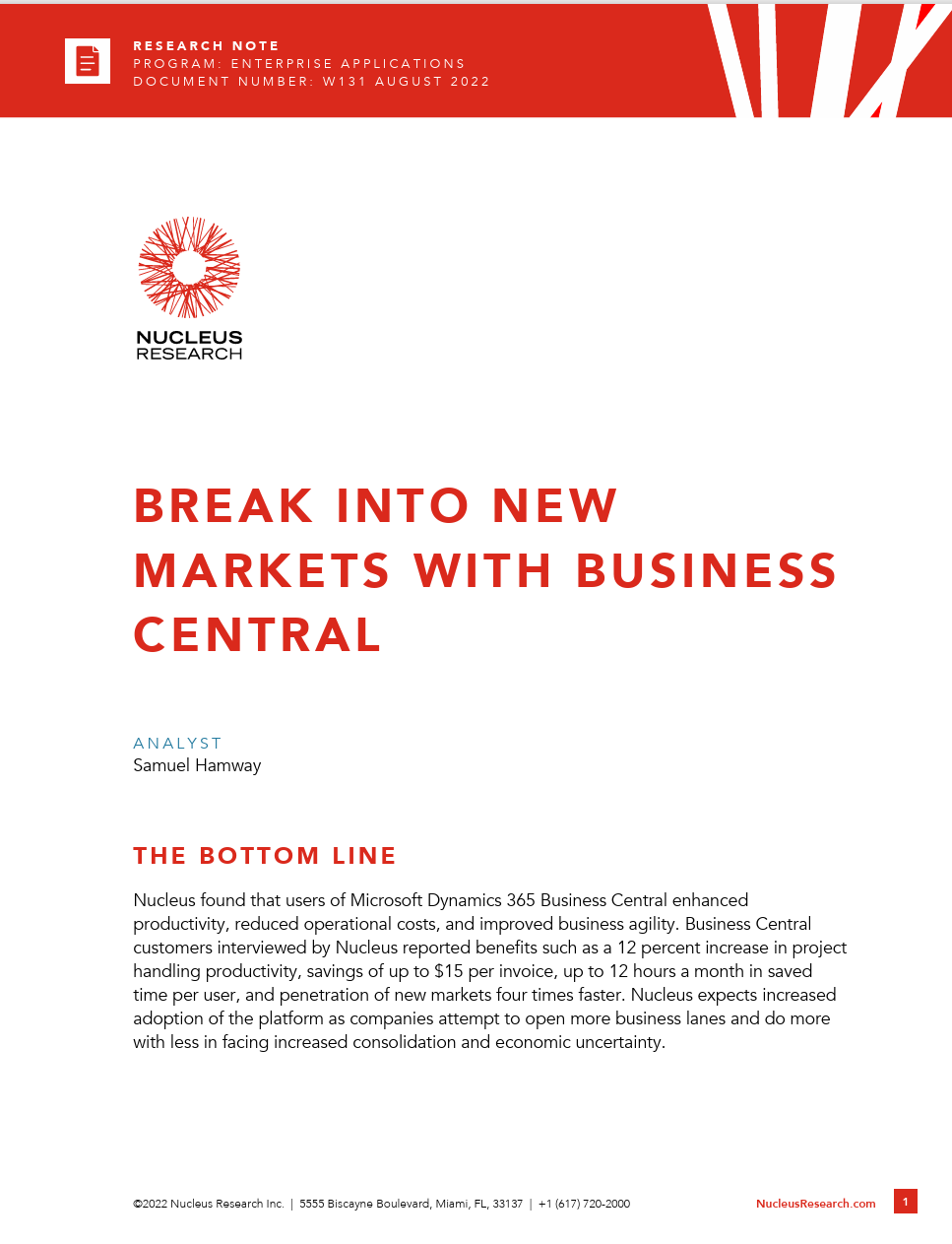Business Central Surpasses Netsuite’s Customer Base
> But how? Find out Here <
Dynamics 365 Business Central vs. Netsuite
Which ERP Solution is Right for You?
Overview
Enterprise Resource Planning (ERP) software is a powerful tool that can help you streamline your business processes, automate your workflows, and gain insights into your performance. However, not all ERP solutions are created equal. Some are too expensive, too complex, or too rigid to meet your specific needs and goals.
If you are looking for a flexible, affordable, and comprehensive ERP solution that can grow with your business, you might be considering Dynamics 365 Business Central or NetSuite. Both are popular choices for mid-market organizations that want to improve their efficiency, productivity, and profitability.
But which one is better for you?
In this document, we will compare Dynamics 365 Business Central and NetSuite on several key factors, such as cost, functionality, integration, and support. We will also provide you with some resources and testimonials from real users who have experienced the benefits of Dynamics 365 Business Central over NetSuite. By the end of this document, you will have a clear idea of why Dynamics 365 Business Central is the best ERP solution for your organization.
Cost vs. Functionality
One of the most important factors to consider when choosing an ERP solution is the cost. You want to get the most value for your money, without compromising on the functionality and quality of the software. But how do Dynamics 365 Business Central and NetSuite compare on cost vs. functionality?
Dynamics 365 Business Central is a simple and cost-effective ERP solution
…that offers a lot of functionality out of the box. You can choose from two user types: Essentials or Premium. Essentials users have access to core features such as financial management, supply chain management, warehouse management, fixed assets, inventory, order management, billing, and more. Premium users have access to additional features such as manufacturing and service management. You can also add unlimited legal entities and third-party add-ons to extend the functionality of Dynamics 365 Business Central.
NetSuite, on the other hand, is an expensive and complex ERP solution
…that requires you to purchase additional modules and suites to get the functionality you need. You have to pay for each user, each module, each suite, and each legal entity separately.
For example, if you want to have advanced financials, advanced inventory, advanced order management, or multi-entity management, you have to pay extra for each of these modules. NetSuite also charges you for data storage, software updates, and support.
To illustrate the difference in cost vs. functionality, let’s use an example of a distribution company looking to move to Dynamics 365 Business Central or NetSuite. The company has 30 users, 5 legal entities, and needs the following modules: financials, supply chain management, warehouse management, fixed assets, inventory, order management, and billing.
Here is a comparison of the annual licensing cost for each ERP solution:
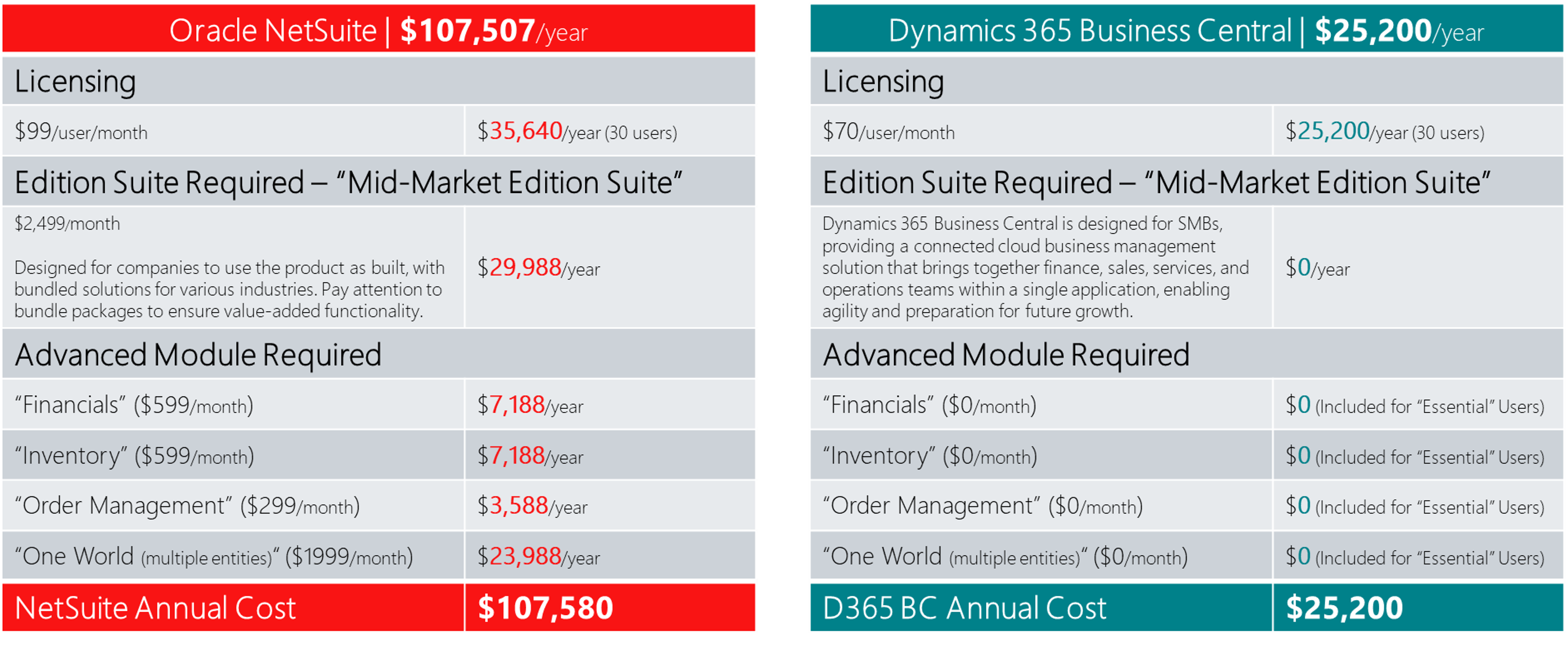
As you can see, Dynamics 365 Business Central is much more affordable than NetSuite, while offering the same or more functionality. In fact, you can save up to $82,380 per year by choosing Dynamics 365 Business Central over NetSuite. That's a huge amount of money that you can invest in other areas of your business, such as marketing, sales, or innovation.
Out-of-The-Box Features
Another advantage of Dynamics 365 Business Central over NetSuite is the amount of out-of-the-box features that are included with the base license. While both ERP solutions claim to offer a comprehensive and integrated suite of modules, the reality is that NetSuite requires you to purchase additional advanced modules for many common business processes and scenarios, whereas Dynamics 365 Business Central provides them as standard with the essentials user license.
Dynamics 365 Business Central offers a complete manufacturing solution, with capabilities such as production orders, bills of material, routings, capacity planning, demand forecasting, and finite loading. NetSuite requires you to buy the advanced manufacturing module to access these features.
These are just some examples of the many features that Dynamics 365 Business Central offers out of the box, while NetSuite charges extra for them. This means that Dynamics 365 Business Central not only has a lower initial price, but also a lower total cost of ownership, as you don’t have to pay for additional modules or subscriptions to get the functionality you need. With Dynamics 365 Business Central, you get more value for your money, and more flexibility to customize and extend your ERP solution to fit your specific business needs.
Market/Customer Base
Another reason to choose Dynamics 365 Business Central over NetSuite is the impressive customer base of the former. Dynamics 365 Business Central has over 50,000 customers worldwide, which is greater than NetSuite’s 43,000 customers.
It is even more impressive considering that Dynamics 365 Business Central has achieved this level of growth in only five years, since its launch in 2018, while NetSuite has been in the market since 1998. This shows that Dynamics 365 Business Central is a more innovative, agile, and competitive ERP solution than NetSuite and that it has a faster adoption rate among mid-sized businesses.
Moreover, Dynamics 365 Business Central is not a new product, but a cloud-based version of Dynamics NAV, a well-established and widely used ERP system that has over 50,000 customers globally. Dynamics 365 Business Central inherits the rich functionality, reliability, and scalability of Dynamics NAV, while also adding new features and integrations that leverage the power of the cloud, AI features (Copilot), and the Microsoft ecosystem. Therefore, when you choose Dynamics 365 Business Central, you are choosing a mature and proven ERP solution that has the backing of Microsoft, one of the world's leading technology companies.
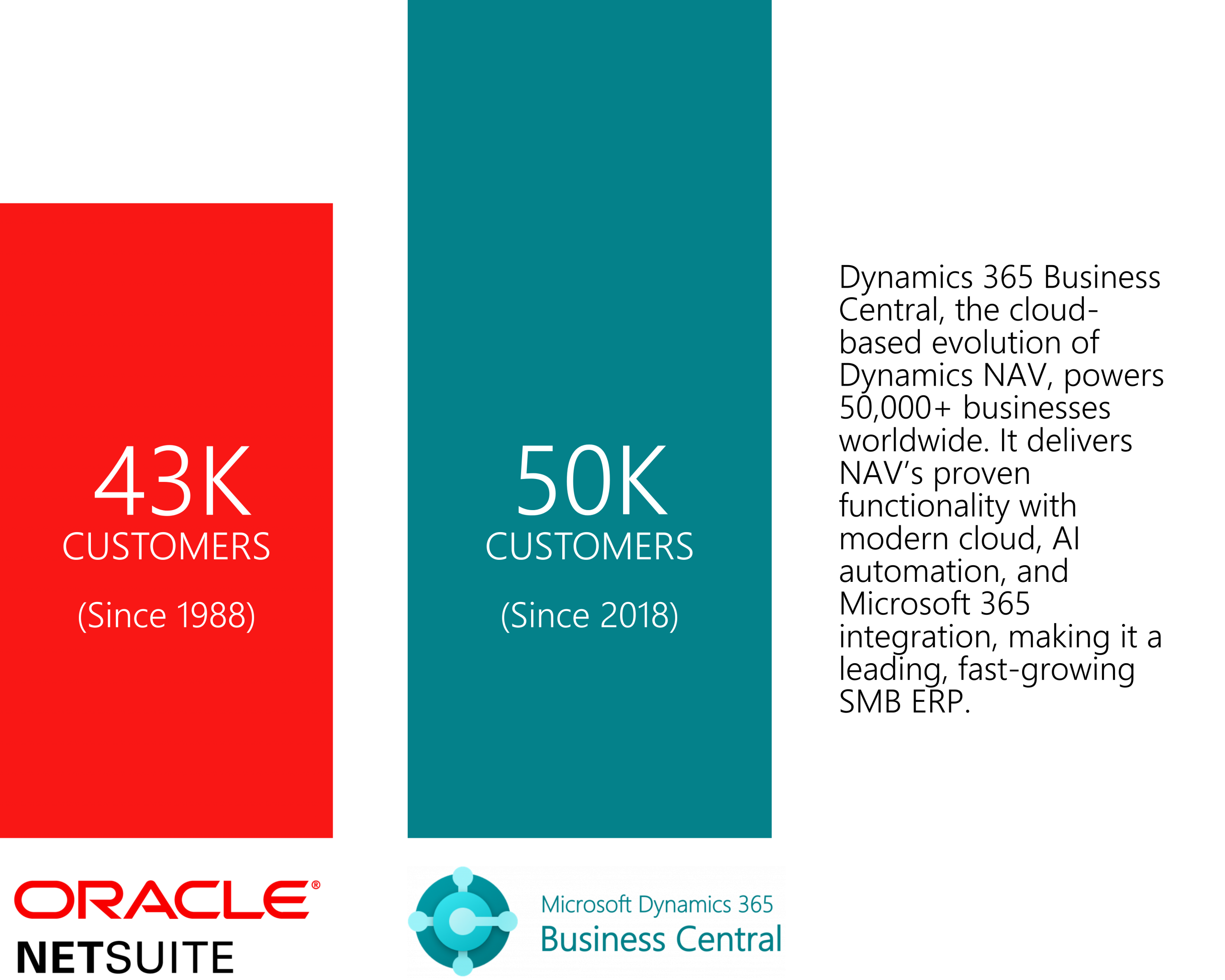
Integration vs. Suite
Another factor to consider when choosing an ERP solution is the integration. You want to have a seamless and consistent experience across all your business applications, without having to deal with multiple systems, platforms, or vendors.
But How do Dynamics 365 Business Central and NetSuite Compare on Integration vs. Suite?
D365 Business Central
Dynamics 365 Business Central is designed to integrate with other Microsoft applications, such as Microsoft 365 (Formerly Office 365), Power BI, Power Apps, Dynamics 365 Sales and more. You can easily access and share data, documents, and insights across these applications, without leaving your ERP environment. You can also leverage the Microsoft cloud platform, Azure, to host, secure, and scale your ERP solution.
Moreover, you can integrate Dynamics 365 Business Central with hundreds of third-party add-ons and apps that are available on the Microsoft AppSource marketplace. These add-ons and apps can enhance the functionality and usability of your ERP solution, and cater to your specific industry or business needs.
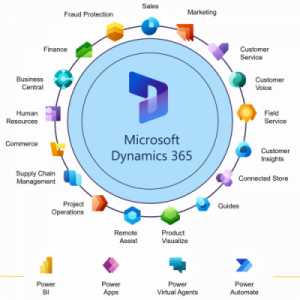
NetSuite
NetSuite, on the other hand, is designed to be a suite of everything. It claims to offer a complete and integrated solution for all your business needs, such as CRM, e-commerce, HR, and more. However, this comes at a cost. You have to pay for each suite separately, and you have to deal with the complexity and rigidity of the NetSuite platform. You also have to rely on NetSuite's own cloud infrastructure, which may not be as reliable, secure, or scalable as Microsoft's. Furthermore, you have limited options to integrate NetSuite with other applications, as NetSuite does not have a robust marketplace of third-party add-ons and apps. You may have to resort to custom development or expensive integration tools to connect NetSuite with other systems.
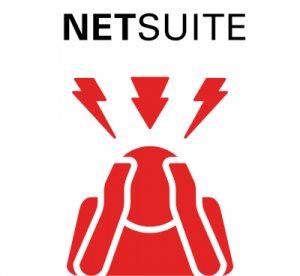
Therefore, Dynamics 365 Business Central offers a better integration vs. suite option than NetSuite. You can have the best of both worlds: a comprehensive and flexible ERP solution that integrates with other Microsoft applications and third-party add-ons and apps, without having to pay for unnecessary or redundant functionality.
We DON’T recommend NetSuite! – Schedule a consultation with our ERP experts to learn about Dynamics 365 Business Central
User Adoption
88% for BC vs. 63% for NetSuite
According to a study by Nucleus Research, Dynamics 365 customers reported an average user adoption rate of 88%, while NetSuite customers reported an average user adoption rate of 63%. This means that Dynamics 365 users are more likely to use the ERP system effectively and consistently, while NetSuite users are more likely to encounter challenges and resistance.
The study also found that Dynamics 365 customers achieved a higher return on investment (ROI) and a lower total cost of ownership (TCO) than NetSuite customers, partly due to the higher user adoption rate.
Some of the reasons why Dynamics 365 Business Central has a higher user adoption rate than NetSuite are:
- Dynamics 365 Business Central has a familiar and consistent user interface that matches other Microsoft products, such as Office 365, Teams, Excel, and Power BI. This reduces the learning curve and increases the user confidence and satisfaction. NetSuite, on the other hand, has a more complex and inconsistent user interface that requires more training and support.
- Dynamics 365 Business Central is more flexible and customizable than NetSuite, allowing users to tailor the ERP system to their specific needs and preferences. Users can also easily extend the ERP system with other Microsoft applications and third-party solutions, without requiring complex coding or development. NetSuite, on the other hand, is more rigid and standardized, limiting the user options and integrations.
- Dynamics 365 Business Central is more intelligent and analytical than NetSuite, providing users with built-in insights and recommendations that help them make better decisions and optimize their business processes. Users can also leverage the power of artificial intelligence and machine learning to automate tasks, predict outcomes, and provide insights. NetSuite, on the other hand, is more transactional and operational, requiring users to manually extract and analyze data.
Support and Training
The final factor to consider when choosing an ERP solution is the support and training. You want to have a smooth and successful implementation, as well as ongoing support and training to ensure that you get the most out of your ERP solution. But how do Dynamics 365 Business Central and NetSuite compare on support and training?

Dynamics 365 Business Central:
- Supported by a network of Microsoft partners.
- Partners assist with implementation, customization, and optimization of your ERP solution.
- Choose partners based on your budget, industry, and location.
- Access resources like online courses, webinars, videos, blogs, and forums.
- Join the active and helpful Dynamics 365 Business Central community to interact with other users, ask questions, share feedback and learn best practices.
NetSuite:
- Supported by fewer NetSuite partners.
- Partners’ skills and knowledge may vary.
- Additional fees may apply for partner services.
- Access resources like online courses, webinars, videos, blogs, and forums.
- NetSuite community may be less active, helpful, or friendly compared to Dynamics 365 Business Central.
Therefore, Dynamics 365 Business Central offers better support and training than NetSuite. You can have a more reliable, responsive, and personalized service from Microsoft partners, as well as more diverse, current, and useful resources and training materials from Microsoft.
Conclusion
In conclusion, Dynamics 365 Business Central is the best ERP solution for your organization, compared to NetSuite. Dynamics 365 Business Central offers:
- A simple and cost-effective ERP solution that offers a lot of functionality out of the box, without requiring you to pay for additional modules or suites.
- A flexible and scalable ERP solution that can adapt to your changing business needs and growth, without compromising on performance or security.
- A modern and user-friendly ERP solution that integrates seamlessly with other Microsoft products and services, such as Office 365, Power BI, Power Apps, and Azure, as well as third-party applications and data sources, giving you a unified and comprehensive view of your business.
- A smart and innovative ERP solution that leverages artificial intelligence, machine learning, and cloud technologies to provide you with insights, automation, and optimization for your business processes and operations.
- A better support and training than NetSuite, with a network of Microsoft partners, a wealth of resources and training materials, and an active and helpful community.
With Dynamics 365 Business Central, you can streamline your business, improve your efficiency, reduce your costs, enhance your customer satisfaction, and increase your profitability. You can also stay ahead of the competition, as Dynamics 365 Business Central is constantly updated and improved with new features and capabilities. Don't settle for less, choose Dynamics 365 Business Central today and enjoy the benefits of a world-class ERP solution.
Still not convinced?
The question between Dynamics 365 vs. NetSuite is a simple one for any small business looking to improve their resource management.
Learn how the flexible features provided by Dynamics 365 can accommodate your ERP expectations.


